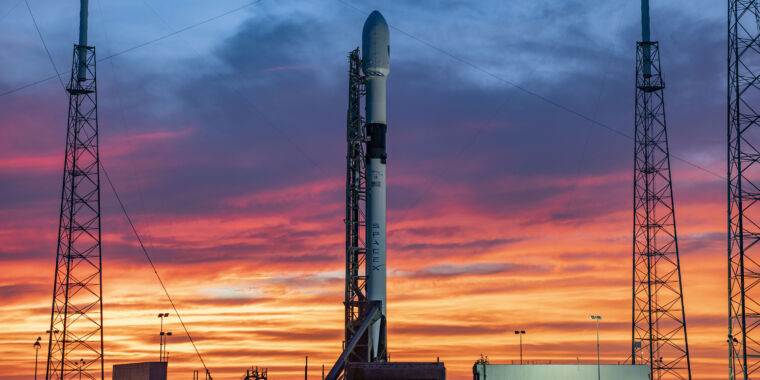SpaceX, Northrop seek to break launch gremlin curse with Friday night attempts

-
A Falcon 9 rocket is seen ready to go on Friday ahead of an evening launch attempt.
-
GPS-III SV04 payload artwork with the updated Space Force insignia.
-
Close-up of new payload fairing.
-
A GPS III satellite buttoned up and ready for launch.
-
GPS III SV04 is encapsulated in its protective launch fairings.45th Space Wing
-
Illustration of a GPS III satellite in orbit.Lockheed Martin
-
The Falcon 9 rocket with sunset hues on Thursday night.
SpaceX has a big launch on tap for this evening, delivering a valuable satellite into orbit for the US Space Force. With a liftoff time of 9:43pm ET (01:43 UTC Saturday), the company’s Falcon 9 rocket is due to deliver a fourth GPS III satellite into geostationary transfer orbit. Weather conditions look good, with a 70-percent chance of “go” conditions.
Built by Lockheed Martin, the GPS III satellites were designed to modernize the current Global Positioning System constellation, providing three-times greater accuracy and improved anti-jamming capabilities. This mission will launch on a new Falcon 9 first stage, but SpaceX and the Space Force have reached an agreement that will allow future GPS missions to launch on flight-proven rockets.
While the payload is important, perhaps more intriguing this evening in Florida will be whether this mission actually gets off the launch pad. The last week has seen a succession of US launch attempts canceled for issues primarily related to ground systems.
Here’s a rundown of all of the delayed launches in the last week from launch pads in Florida, Texas, and Virginia:
New Shepard, experimental flight
September 25: As the suborbital New Shepard launch system was counting down toward liftoff, the launch was called off due to an unspecified “technical issue.”
New launch date: At the time, Blue Origin said a new launch target would be “forthcoming,” but no new date has been set.
Delta IV Heavy, NROL-44 mission
September 26: A day before liftoff, the classified mission is delayed due to a problem with the launch pad’s swing arm retraction system.
September 29: Lightning in the area and a hydraulic leak in the Mobile Service scrubbed the launch hours before liftoff.
September 30: Scrubbed at T-7 seconds due to “an unexpected condition” prior to the engine start sequence.
New launch date: United Launch Alliance has not set a new date for what will be the fifth launch attempt of this mission.
Falcon 9, Starlink-12 mission
October 1: At T-18 seconds, an “unexpected ground sensor reading” triggered an automatic abort.
New launch date: The unconfirmed launch target is 8:34am ET (12:34 UTC) on Saturday.
Antares 230, NASA supply mission
October 1: At T-2 minutes 40 seconds, launch scrubbed due to ground software issue.
New launch date: Northrup Grumman says it will attempt to launch again at 9:16pm ET Friday (01:16 UTC Saturday).
Back-to-back launches ahead
As a result of these six scrubs in a week, it is a bit remarkable to think that the last rocket to actually lift off from US soil came back on September 12. Can you guess which one? It was actually Astra’s Rocket 3.1, flying briefly from a spaceport in Kodiak, Alaska. The last rocket to succeed in delivering a payload to orbit was SpaceX’s Falcon 9 booster, with the Starlink-11 mission on September 3.
Depending on how their countdowns proceed on Friday evening, it’s possible that Northrop’s Antares rocket could launch from Wallops Island, Virginia, and the Falcon 9 rocket could take off from Florida’s Cape Canaveral Air Force Station less than half an hour later.
Additionally, should SpaceX successfully launch the GPS III satellite on Friday evening, there is the potential to launch its Starlink-12 mission from a separate Florida pad—Launch Complex 39A at Kennedy Space Center—less than 12 hours later. This would shatter the company’s current record of just under 48 hours between a December 3, 2018 launch from Vandenberg Air Force Base in California, and a December 5 launch from Cape Canaveral.
Listing image by SpaceX
https://arstechnica.com/?p=1711240